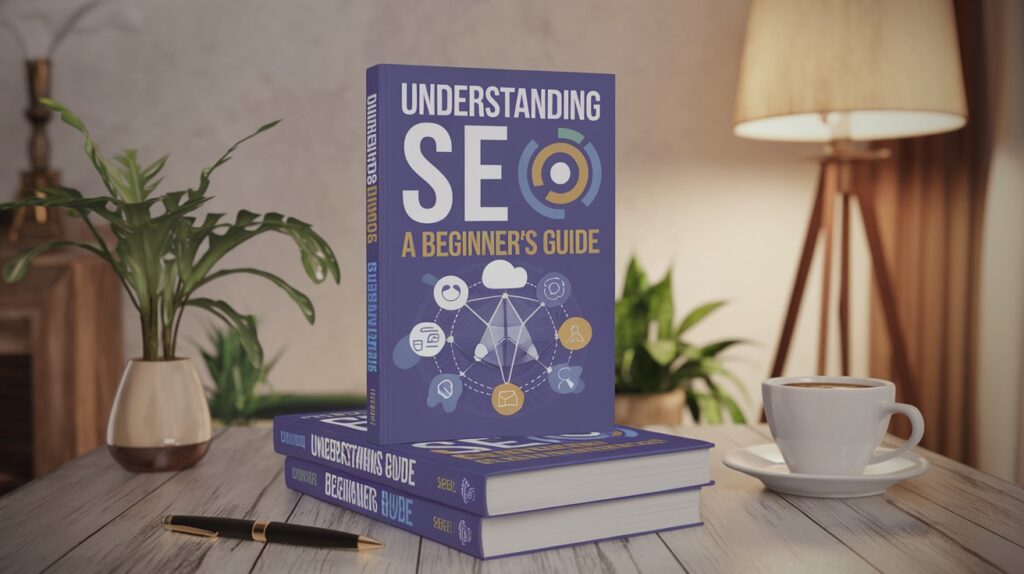Welcome to this SEO Beginner’s Guide, which will help you understand how to enhance visibility in the digital age and improve your business’s digital presence. For businesses, this means being found online. But how do you ensure your business stands out in the vast digital landscape?
Enter Search Engine Optimization, or SEO.
SEO is a powerful tool that can propel your business to the forefront of online searches. It is a complex field, but understanding its basics can significantly boost your online presence.
This SEO Beginner’s Guide is designed to help beginners navigate the world of SEO. We will explore what SEO is, why it matters, and how it works.
We will also dive into the differences between local and organic SEO, and provide entry-level strategies to get you started.
By the end of this guide, you will have a solid foundation in SEO, ready to take your business to new digital heights.
What is SEO and Why Does it Matter? Insights from Our SEO Beginner’s Guide.
SEO stands for Search Engine Optimization. It is the practice of enhancing your website to improve its visibility on search engines. When done right, SEO helps your site appear higher in search results, attracting more potential customers.
Why is SEO crucial for businesses today? In an era where most consumers start their shopping journey online, being visible on search engines is vital. A high search ranking increases your credibility and trust with potential clients.
Here is why SEO matters:
- Increased Online Visibility: More people can find your business.
- Targeted Traffic: Connect with users actively searching for your products.
- Cost-Effective: Unlike paid ads, organic results can be more sustainable in the long run.
Though SEO might seem complex, its core lies in understanding search engines and user behavior. By aligning your strategy with these elements, you create a robust online presence.
In essence, SEO is about making your site accessible, relevant, and authoritative. This translates into better engagement with your audience, ultimately driving growth and success for your business.
The Mechanics of Search Engines
Search engines like Google work diligently to deliver the most relevant results. They do this through a series of intricate algorithms. These algorithms assess various factors to rank web pages, including content quality, site speed, and backlinks.
Crawling and indexing are central to how search engines work. They send out bots or “spiders” to scan and index web pages. This process involves tracking links from one page to another, collecting data along the way.
Understanding these mechanics aids your SEO efforts. It’s about adapting your site to meet search engine criteria. This way, when users type queries, your site aligns perfectly with what they seek. The goal is to create content and experiences that satisfy both the bots and your potential customers.
Keywords: The Foundation of an SEO Beginner’s Guide
At the heart of effective SEO lies keyword optimization. Keywords are terms that users enter into search engines. They serve as a bridge between your content and potential customers searching for it.
Selecting the right keywords involves research and strategy. Consider relevance, search volume, and competition. Prioritize keywords that best represent your business and what your audience is looking for.
Here is a quick guide to getting started with keywords:
- Identify Your Audience: Know who you want to attract.
- Research Competitors: See what keywords they are targeting.
- Use Tools: Leverage tools like Google Keyword Planner to find valuable keywords.
Incorporating these keywords seamlessly into your content enhances your site’s relevance. However, avoid overloading your pages with them, known as “keyword stuffing.” Balanced and natural use of keywords ensures both readability and search engine friendliness. Learn more about Keywords here.
On-Page vs. Off-Page SEO: Understanding the Difference
On-page and off-page SEO are the two main pillars of search engine optimization. Understanding their roles helps in crafting a holistic strategy. Let’s dive into what distinguishes them and how they complement each other.
On-page SEO refers to the optimization techniques applied directly on your website. This includes optimizing title tags, meta descriptions, headers, and images. Content quality, internal linking, and mobile-friendliness are also crucial elements of on-page SEO.
Off-page SEO, on the other hand, involves activities conducted outside your website. These aim to boost your site’s authority and relevance. Link building is a major off-page strategy, where acquiring backlinks signals trustworthiness to search engines.
Here is a simple breakdown:
- On-Page SEO: Content quality, meta tags, site structure
- Off-Page SEO: Backlinks, social media signals, online reputation
Balancing both on-page and off-page efforts creates a strong SEO foundation. On-page ensures your site is optimized and user-friendly, while off-page expands its reach and credibility. Together, they enhance your site’s ranking potential, driving more organic traffic.
The Power of Quality Content in SEO
Quality content is the essence of successful SEO. It informs and engages your audience, creating value that search engines recognize. When your content answers user queries effectively, it encourages longer site visits and builds trust.
Content quality is about more than just information. It involves crafting compelling narratives and using clear, simple language. Visual elements like images and videos enhance understanding and engagement.
Search engines prioritize content that satisfies user intent. This requires understanding your audience’s needs and crafting content that meets them. Keep content fresh and updated, as relevance is key in maintaining authority in your niche.
In summary, quality content attracts both users and search engines. It serves as the foundation for building relationships and enhancing your brand’s online presence. Investing in content quality is investing in your site’s long-term success.
Entry-Level SEO Beginner’s Guide
Starting with SEO can seem daunting, but this SEO Beginner’s Guide simplifies the process with foundational strategies. Implementing these basics sets the stage for long-term success and better visibility.
First, keyword research is crucial. Identify keywords relevant to your business and audience. Use tools to uncover search terms that align with your offerings.
Next, optimize your website’s on-page elements. This includes crafting compelling title tags and meta descriptions. Ensure your content is relevant, valuable, and easy to read.
Consider these entry-level strategies:
- Conduct thorough keyword research to understand what potential customers are searching for.
- Optimize on-page SEO elements such as headers, images, and internal links.
- Create quality, engaging content that provides value and answers user queries.
Patience is vital, as SEO is a long-term commitment. With consistency in effort, these beginner strategies gradually enhance your site’s ranking and traffic. Start simple, and as you grow, incorporate more advanced tactics.
Common SEO Mistakes to Avoid
Despite the best intentions, beginners often fall into common SEO traps. Avoiding these pitfalls ensures your efforts yield positive results over time.
One mistake is keyword stuffing, where you overuse keywords within your content. This can hinder readability and may lead to search engine penalties.
Another frequent error is neglecting mobile optimization. Many users access content via mobile devices, so ensure your site is mobile-friendly.
Lastly, avoid duplicate content. Search engines prioritize unique, high-quality content. Keep content fresh and original to maintain rankings and user interest. Prioritizing these elements helps lay a strong foundation for an effective SEO strategy.
Staying Ahead: The Evolving Nature of SEO
The world of SEO is in constant flux, shaped by technology and changes in user behavior. To remain competitive, it is crucial to keep abreast of trends and updates.
Search engines consistently refine algorithms to deliver better results. Staying informed about these changes helps you adjust strategies accordingly. Subscribing to reputable SEO blogs and engaging in industry forums can provide valuable insights.
However, adapting is not just about understanding shifts; it involves innovation. Continuously test new tactics and measure their impact. This approach ensures your strategies are effective and optimized for the latest standards, keeping you ahead in the digital race.
The Importance of Analytics and Measuring Success
Analytics play a pivotal role in evaluating the success of your SEO efforts. They provide data on site performance, visitor behavior, and conversion rates.
Utilizing tools like Google Analytics helps track essential metrics. These insights inform decisions, allowing you to refine strategies and improve outcomes.
Regular analysis identifies which tactics are working and which need adjustment. This data-driven approach enhances ROI, ensuring resources are used effectively. By focusing on analytics, businesses can maintain a nimble, responsive SEO strategy that aligns with goals and drives sustained growth.
Explore the world of SEO by checking out the Moz SEO Guide for beginner-friendly insights.
Aligning SEO with Your Business Goals
In the digital age, SEO is indispensable for achieving business success. Tailoring your SEO strategy to align with your unique goals can drive meaningful results.
Think of SEO as an ongoing journey rather than a one-time task. Regularly evaluate your objectives and ensure that your SEO practices are in sync with them. This alignment helps improve visibility, attract the right audience, and ultimately boosts conversions. By consistently optimizing and adapting, you position your business for sustainable growth in the evolving digital landscape.


